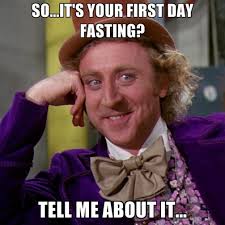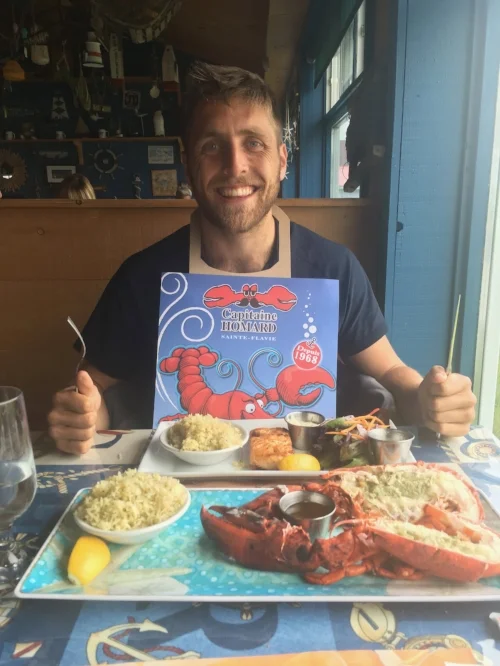6 Reasons Intermittent Fasting Is ESSENTIAL During Traveling
"The newest diet trend". "The new way to love food". "How to lose weight without changing what you eat". These are only some of the headlines that come up when you search Intermittent Fasting on Google.While I personally swear by Intermittent Fasting or IF for short, there are many that are against the practice. Before we get to why I believe Intermittent Fasting is amazing for traveling, here’s an explanation of the different methods and history of IF.
WHAT THE HECK IS INTERMITTENT FASTING?
Intermittent Fasting, according to Harvard Health is, “severely limiting calories during certain days of the week or during specified hours during the day. The theory is that this type of diet will help decrease appetite by slowing the body's metabolism.” In other words, IF involves not eating for anywhere from 16 hours to a few days or even weeks! There are a few different methods to Intermittent Fasting. Most people chose a variety of methods that work for them and their lifestyle. If you are interested in a great in-depth guide, Nerd Fitness does a great job of breaking down Intermittent Fasting for beginner's. Amazon also has an app that makes it easy to plan out a fast called TrackMyFast. The link is below. The three most well known methods are the 16/8 Method (Lean Gains Protocol), the 5:2 Method, and the Eat-Stop-Eat Method. The three methods are highlighted below:
16/8 METHOD:
The 16/8 method, also known as Lean Gains Protocol, you fast for 16 hours and have an 8 hour “feed” period where you’ll have all of your meals. This is a daily fasting option and many people do this method without even knowing it. You can choose the hours that work best with you and your schedule.
HUGH JACKMAN DISCUSSING THE 16/8 METHOD AT 2:00 MINUTES:
5:2 METHOD:
This method is for those that want to dip their toes into the Intermittent Fasting pond. You eat normally for 5 days, but restrict your calories for the other two days of the week to about 500-600 calories. This method is simple and straight forward. Again, you pick the two days to restrict your calories on.
EAT-STOP-EAT METHOD:
Finally, my favorite method for traveling and the most difficult, involves not eating for a full day. It is very straight forward. Eat nothing for a full day. No planning, no thinking. Just don’t eat and travel. It is best to start with the 16/8 method if you want to work your way up to the 24 hour fast and progress from there.
CAN YOU DRINK LIQUIDS ON FASTS?
If you are hardcore, then the answer is no. I allow myself to consume water and coffee on my fasts (no sugar, milk, cream, or butter, just coffee!)
WHO CAN DO INTERMITTENT FASTING?
Men and women that are healthy, not pregnant, and have enough mental strength and discipline. Women are not advised to do longer fasts due to potential hormone damage that it can cause, but 14-15 hours is perfectly fine. Men have an advantage in this regard.
BRIEF HISTORY OF INTERMITTENT FASTING
Intermittent Fasting is not new and has been around for a long time. Cave man days long time! It started with our ancestors who would go through periods of food abundance and scarcity. They would fast during periods of scarcity and eat as much as they could during periods of abundance. This is why it takes 20 minutes for our brains to know that we are full from eating. Many famous and key figures in the world have partaken in the practice such as Hippocrates, Plutarch, and Benjamin Franklin. In addition, all major religions have some aspect of fasting built into their own belief system.
Now that we have gone over what IF is, different methods, who can do it, and a brief history, here are my six reasons why Intermittent Fasting is ESSENTIAL for traveling:
1. EFFICIENCY: Your flight landed in Frankfurt from Chicago, but you now have to catch a 9 hour bus to meet your friends for a crazy weekend (and workout) in Berlin. You need to get your bags from baggage claim, go through German border security, get your bearings, take a taxi to the bus station, and eat something.. Oh wait you can cross that last one off the list since you are fasting for 24 hours. It allows you to focus on where you are going. If trying to get to your destination without any delays is your goal, then IF is perfect for you.
Too Many Sights To See In Berlin..Might As Well Fast!
2. MORE $: If you fast for at least 16 hours, that means you cut out at least one meal per day, which an average meal let’s say would cost you $5. If you do this every time you move to a new place every 3-4 days, that would save you almost $50 a month to spend on anything you want! It may not seem like a lot, but over time it really adds up. Who wouldn’t want to travel longer?
3. ENERGY: I love eating new food everywhere I go, but my body is extremely sensitive to a whole new diet, since I pretty much eat the same thing everyday back home. This can lead to major stomach issues like the infection I had in Baños, Ecuador. I find that when I fast I have more energy and I am more alert. It allows you to pack in more sightseeing opportunities or head out with fellow backpackers after a long day to catch the sunset when you would normally need a nap.
4. CONTROL: Things happen, planes, buses are late, plans change, you don’t speak the native language. A lot of these things you cannot control, but on the road you can control your attitude and how you treat your body. I find that IF gives me a sense of control that I otherwise might not have in a foreign country. Even though I have been to many different countries, I still sometimes do get overwhelmed by the culture, the language, the people and that can be tiring. IF lets me feel at ease as I hold on to a small part of my routine.
5. TIME: Have you ever realized how much of your time is spent going to get food, eat food, coming back from getting food when you travel? Sometimes the majority of my day revolves around food when I travel (Nothing wrong with this, actually love this about traveling :)) When you do IF, however, you suddenly have more time to start writing that diary or reading that book you’ve been meaning to read your whole trip, reflecting, or trying new activities.
6. CLEANSE: If you’ve done a backpacking trip, everyone has hit a point where they feel gross. Maybe it’s all the late night drinking that’s finally taking a toll, the food that your body is not used to, or sitting during 18 hour bus rides across the country. Either way, your body, especially your digestive system, needs a pause to reset and cleanse itself. It needs a break from all of the damage you’ve done to it during your trip. So do yourself a favor and fast!
Looking for more than just physical health tips? Mental health is important too!
Delicious Lobster Meal To Break A 16 Hour Fast in Gaspé
While Intermittent Fasting is hard, it is well worth it once you actually start putting it into practice. I think that you’ll start seeing and feeling the benefits right away. Beyond how you feel, IF can help you lose weight, reduce inflammation in the body, and even help you live longer! Like anything else, the more you practice, the better you will become so I would advise you to start slow at home and work your way up to whatever your IF goal is before you go backpacking. Eventually, it will become second nature and you will think everyone who does NOT do Intermittent Fasting is crazy :) Feel free to reach out to me through the contact section, Facebook, or Instagram. Also, subscribe to follow along on my journey!
CarryOnTravelFitness is a participant in the Amazon Services LLC Associates Program, an affiliate advertising program designed to provide a means for sites to earn advertising fees by advertising and linking to Amazon.com. All of the thoughts and opinions expressed on my site our my own and I was not paid for or mandated to provide a positive review.


